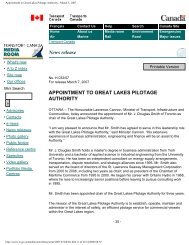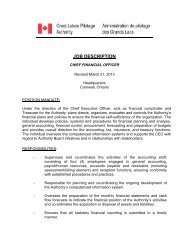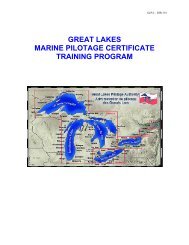2012 - Great Lakes Pilot Authority, Canada
2012 - Great Lakes Pilot Authority, Canada
2012 - Great Lakes Pilot Authority, Canada
You also want an ePaper? Increase the reach of your titles
YUMPU automatically turns print PDFs into web optimized ePapers that Google loves.
(iv) Impairment of financial assets other than those measured at fair value<br />
Financial assets are assessed for indicators of impairment at each period end. Financial assets are impaired<br />
when there is objective evidence that, as a result of one or more events that occurred after the initial recognition<br />
of the financial asset, the estimated future cash flows of the investment have been impacted.<br />
Objective evidence of impairment could include the following:<br />
• Significant financial difficulty of the issuer or counterparty;<br />
• Default or delinquency in interest or principal payments; or<br />
• It has become probable that the borrower will enter bankruptcy or financial reorganization.<br />
For financial assets carried at amortized cost, the amount of the impairment is the difference between the asset’s<br />
carrying amount and the present value of the estimated future cash flows, discounted at the financial asset’s<br />
original effective interest rate.<br />
The carrying amount of all financial assets, excluding accounts receivables, is directly reduced by the impairment<br />
loss. The carrying amount of accounts receivables is reduced through the use of an allowance account. When<br />
accounts receivable are considered uncollectible, it is written off against the allowance account. Subsequent<br />
recoveries of amounts previously written off are credited against the allowance account. Changes in the carrying<br />
amount of the allowance account are recognized in profit or loss.<br />
If, in a subsequent period, the amount of the impairment loss decreases and the decrease can be objectively<br />
related to an event occurring after the impairment was recognized, the previously recognized impairment loss is<br />
reversed through profit or loss. On the date of impairment reversal, the resulting carrying amount of the financial<br />
asset cannot exceed what its amortized cost would have otherwise been at that date had the previous impairment<br />
loss never been recognized in the first place.<br />
(v) Derecognition of financial assets<br />
A financial asset is derecognized when:<br />
• The contractual right to the asset’s cash flows expire; or<br />
• If the <strong>Authority</strong> transfers the financial asset and substantially all risks and rewards of ownership to another entity.<br />
(l) Financial liabilities<br />
Financial liabilities are classified as either financial liabilities at FVTPL or other financial liabilities. All of the <strong>Authority</strong><br />
financial liabilities are classified as other financial liabilities.<br />
(i) Other financial liabilities<br />
Other financial liabilities are initially measured at fair value, net of transaction costs, and are subsequently<br />
measured at amortized cost using the effective interest method, with interest expense recognized on an effective<br />
yield basis.<br />
The effective interest method is a method of calculating the amortized cost of a financial liability and of allocating<br />
interest expenses over the corresponding period. The effective interest rate is the rate that exactly discounts<br />
estimated future cash payments over the expected life of the financial liability, or, where appropriate, a shorter<br />
period, to the net carrying amount on initial recognition.<br />
The <strong>Authority</strong> has classified other accounts payable and accrued charges and accrued salaries and benefits as<br />
other financial liabilities. Due to the short-term nature of these accounts, their carrying values are deemed to<br />
approximate their fair values.<br />
24<br />
<strong>2012</strong> Annual Report







